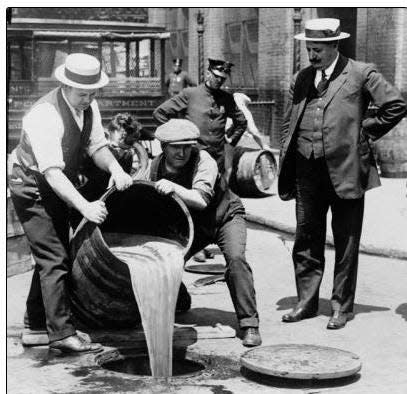Prohibition: The jury tasted the evidence and found defendant not guilty
It would never be allowed in a Delaware trial today; but when a jury asked to examine the evidence closely, really closely, the judge said, “OK.”
A hundred years ago, juries operated by different rules that allowed much more freedom when it came to authenticity of the evidence. In some cases, juries were allowed to conduct their own tests, and that is what happened in the case of defendant Elmer Fisher, charged with possessing illegal alcohol.
National Prohibition officially began on Jan. 18, 1920, but Delaware was already legally dry.

The state’s local option to ban alcoholic beverages, and several state laws that made it illegal to possess alcohol, were in effect before the ratification of the Eighteenth Amendment that prohibited the manufacture and sale of alcohol throughout the United States.
Despite the state and national anti-alcohol laws, Delaware devotees of intoxicating beverages were well-supplied with illegal booze from rumrunners who landed illegal booze along the Delaware’s Atlantic coast from Fenwick Island to Cape Henlopen.
There were also rumrunners who slipped into Delaware Bay to unload cases of alcohol at some of the bayfront beaches. On the western side of the state, truckers slipped across long Delaware’s border with Maryland carrying illegal hooch.
In addition to this constant supply of intoxicating beverages, there were those who saw Prohibition coming and hoarded a stock of alcoholic beverages.
In January 1920, William Fisher was transferring several wooden cases from two cars into a house on Orange Street in Wilmington, arousing the suspicions of Detective Francis Green.
When the Wilmington detective went into the Orange Street house, he found 30 cases of whiskey, containing 358 full fifths of booze. Fisher was arrested, but he refused to say where he got the whiskey.
The next day, the police raided the home of Elmer Fisher, William’s brother, where they found over seven full cases of whiskey and nearly two cases of brandy. Elmer Fisher said he bought the liquor before July 1, 1919, when the laws restricting ownership of alcoholic beverages went into effect.
Elmer claimed he bought it for his own use and with his own money. The Fishers were moving the liquor from Monroe Street to his father’s house on Orange Street.
Elmer said he wanted the alcohol for his baby so that he and his wife could rub the baby with it. Finally, he maintained that he had not taken a drink for 12 years. He, however, want to be prepared in case he started drinking again.
When Elmer Fisher was tried in October, the case had gained such notoriety that the Wilmington Evening Journal reported, “The case aroused so much commotion in the Public Building that all business was suspended during the hearing.”

The 85 quarts of liquor were brought into the courtroom as evidence. and after the case was argued, the jury retired to consider the verdict. They took with them one of the bottles of evidence to make sure that it was whiskey.
After some time, the jury had not reached a decision, and the tension began to mount in the courtroom. Finally, the bailiff appeared and whispered something to the prosecuting attorney, who announced, “The jury wants another quart of whiskey.”
The additional evidence was dispatched to the jury room. A short time later, the jury announced that it had reached a verdict.
In the words of the Evening Journal: “When the jury returned, both bottles bore evidence of having been thoroughly tested.” Apparently, the content of the two bottles was not strong enough for the jury’s tastes, and Fisher was found not guilty and released.
Principal sources:
Sunday Morning Star, Jan. 18, 1920.
Evening Journal, Oct. 8,1920.
More: Women's health care is a 'dire need' in Sussex County. And pregnant women, doctors know it
More: Bacon-infused beer? Wawa, Campbell, other firms pair with craft brewers
This article originally appeared on Salisbury Daily Times: Prohibition: The jury tasted evidence and found defendant not guilty
